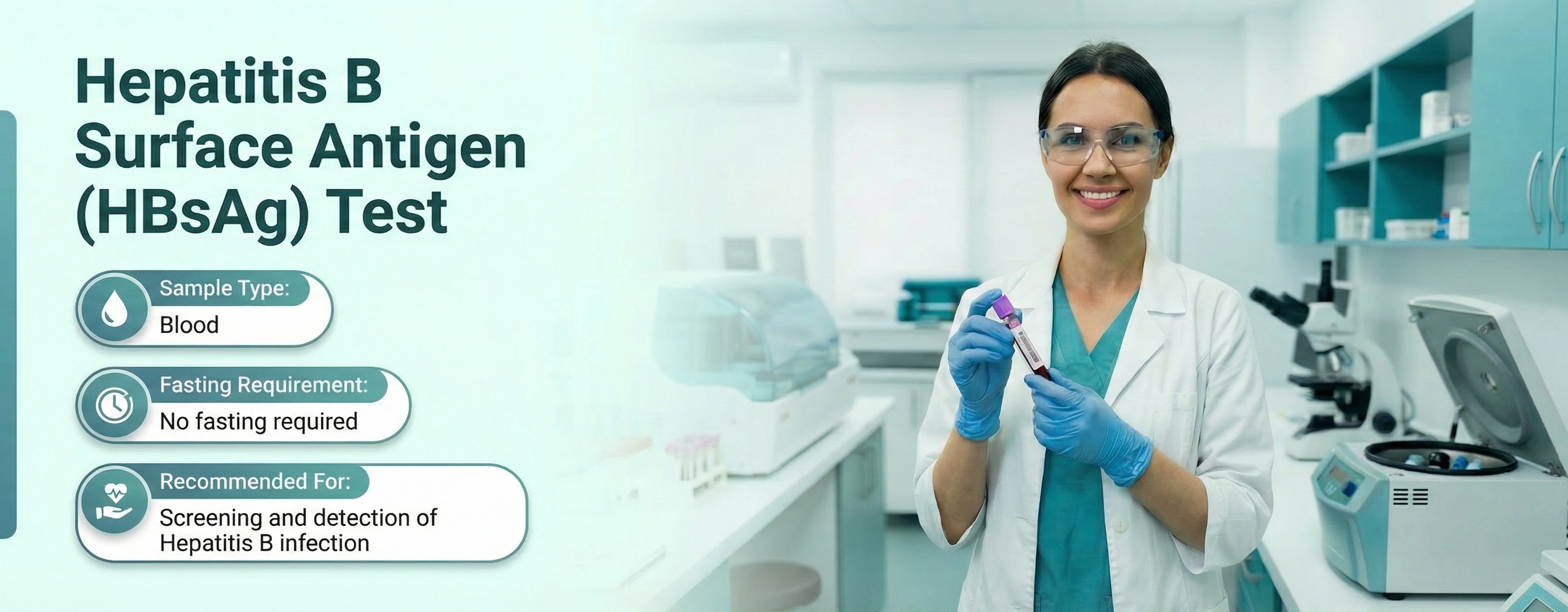414+ orders placed in your location
100% NABL & ISO Certified Lab • 100% Accurate Reports
Hepatitis B Surface Antigen (HBsAg) Test
Hepatitis B surface antigen test
- SummaryThe Hepatitis B Surface Antigen (HBsAg) Test helps detect an active hepatitis B infection or past exposure to the virus. It’s often recommended if you show symptoms like fatigue, loss of appetite or jaundice, or if you’ve travelled to high-risk areas. This test uses a blood sample and does not require fasting, with no age or gender restrictions.Read more
- Reports Within36 HrsView Sample Report100% NABL & ISO Certified Labs
- SampleBlood
- AgeAll Age Group
- GenderMale and Female
- FastingNot Required
PharmEasy Promises
Know More About The Test
A quick info on HBsAg test
Overview
Several different forms of viruses exist. Some of them cause minor symptoms that are hard to notice and easy to address, while others may be more serious or infectious. Viruses typically enter and affect a particular part of the body, lowering its functioning and efficiency. The Hepatitis B virus is very infectious and usually attacks the liver.
The Hepatitis B virus can be easily tested using a simple blood test that can be taken at any time during the day.
A Hepatitis B panel test can help give information about past exposure to Hepatitis, identify current infection and reveal immunity to the virus. From a range of examinations, the HBsAg test shows if the Hepatitis infection currently exists in your body and if you run the risk of passing it to others.
Other tests conducted as part of the Hepatitis panel include HBsAb, HBcAb and IgM. These tests can show whether immunity to Hepatitis has been built or if there have been past infections.
The HBsAg test is used in the diagnosis of Hepatitis in cases where symptoms including pain, loss of appetite, discolouration of the skin, urine and stool or fatigue are experienced. Although difficult to ascertain, some of the risk factors that could cause Hepatitis includes passing or exchanging body fluids, blood and semen. While the HBsAg blood test is important when your doctor notices any of these symptoms, it may also be suggested if you have recently travelled to places where Hepatitis is common.
Hepatitis B is the most common yet serious liver condition. Known as a silent epidemic, it is hard to know when you have been infected since there are no visible symptoms in the initial stages. Today, Hepatitis B can be easily diagnosed with the HBsAg blood test and treated quickly.
Hepatitis B is widely prevalent in India, with a greater concentration in Arunachal Pradesh and the Andamans. There is a significant increase in the prevalence of the condition among tribal populations compared to non-tribal Indians. The most important reason for outbreaks is infection through unsterilized or inadequately sterilized syringes and needles. The case of the acute outbreak in Modasa, Gujarat, is a classic case in point. The overall rate of Hepatitis B in India stands between 3 and 4%.
Sample Type
Results of HBsAg blood tests are clear indicators of whether an individual has the virus in the body at present. A single blood sample is sufficient to complete an entire Hepatitis sample.
Risk Assessment
Hepatitis B
What does this Test Detect?
The HBsAg test checks for surface antigens, which are proteins found on the surface of the Hepatitis B virus. When the protein levels are high, it is a sign of either acute or chronic infection. The test helps diagnose chronic and acute HBV infections.
Individuals most likely to be recommended for an HBsAg blood test include:
- HIV-positive individuals
- Individuals using injection drugs regularly
- Blood, organ, tissue, plasma and semen donors
- Individuals undergoing or seeking any form of immunosuppressant therapy, including chemotherapy, organ transplant or immunosuppression for gastric or rheumatologic disorders
- Individuals with AST/ALT of unknown cause or origin
- Haemodialysis patients
- Pregnant women
- Infants with HBsAg-positive mothers
- Anyone sharing household, sex contacts or needles with HBsAg-positive individuals
- Men who have intercourse with men
- Individuals with multiple sexual partners
- Those returning from countries with a high Hepatitis B rate
- Anyone with end-stage kidney disease
- Individuals who have chronic liver ailments
- Emergency, healthcare and other workers who come in contact with and are regularly exposed to blood
Indications for HBsAg Test
A positive HBsAg test usually indicates a sign of Hepatitis B. Since the symptoms may not show for a considerable amount of time, certain indicators can also prompt your physician to recommend an HBsAg blood test. These signs include:
- Yellowing of the eyes and skin
- Persistent nausea or vomiting
- Increased fatigue and weakness
- Joint pain and/or fever
- Darkened urine
- Abdominal pain
How Frequently should you take this Test?
A random thyroid profile test helps with the diagnosis of hyperthyroidism, hypothyroidism, or other conditions. If the result of the thyroid profile test confirms a diagnosis, appropriate medication should be taken. The test has to be repeated every three months, at a minimum, when a person is on medication for a thyroid disorder to evaluate the effectiveness of ongoing treatment. The test can be annual only if not on any medication or if the previous thyroid profile test results were normal.
Test Preparation
The HBsAg test is fairly simple and only requires a random blood sample. This can be collected from the vein by a nurse, doctor or any other qualified person from a lab. Here are some precautions and considerations that should be taken into account before, during and after the test:
Before the test
There is no special preparation required during the HBsAg testing procedure. However, do ensure you inform your doctor about any conditions and medication that you have been taking.
During the test
The site (vein in the arm) is cleaned and a needle is used to collect the blood sample. The process is simple and can take up to five minutes. Keep in mind that there could be minor bruising or a slight throbbing soon after blood collection.
After the test
There is no special attention or care required following the test.
Parameters
HBsAg results are essential in checking for present infections.
Other related tests like the anti-HBs and anti-HBc are also conducted using the same blood sample. They help check whether the individual has had past infections or developed immunity to the condition.
If an HBsAg report is found positive, a few additional tests may be carried out to determine the health status, degree of contagiousness and plan a course of treatment. Some of the tests include:
- Hepatitis B e antigen: To check for the antigen, which helps understand to what extent the individual may spread the condition to others.
- Hepatitis B e antibody: To check the acuteness of the infection.
- Hepatitis B viral DNA: To detect the DNA and load of the virus in the blood.
Test Result Interpretation
While the blood culture does examine HBsAg, the readings can only be comprehended when the complete Hepatitis B test panel has been taken into consideration.
Unlike many other tests, the HBsAg screening test does not contain values and ranges. Instead, it only indicates whether the individual is positive or negative on the parameters examined. The HBsAg test by ELISA or CLIA method gives a quantitative value of the HBsAg. The permutation of positives and negatives on the three readings leads to certain conclusions. However, since it is rather complex, the HBsAg test report is best studied by a doctor.
HBsAg Hepatitis B Surface Antigen | HBsAb Hepatitis B surface Antibody | HBcAb Hepatitis B Core Antibody | Interpretation |
- |
- |
- | Not infected; at risk for potential Hepatitis B infection |
- | + | - | Has not been infected; does not have the virus |
- |
+ |
+ | Has recovered from hepatitis B infection; is not a threat to infect others; shows the presence of surface antibodies from natural infection |
- |
- |
+ | Inconclusive result; possibility of current or prior infection; further investigation required |
+ |
- |
+ | Infected; potential threat for infecting others; needs more testing |
The normal values, parameters, and reference ranges of the test may vary from lab to lab. Please refer to the ranges mentioned in the report and consult a doctor to understand the interpretation of lab reports.
Price/Cost
Typically, an HBsAg test is priced in the range of INR 359 to INR 599. However, the price can vary based on the city and the laboratory chosen. To provide a more detailed overview, here are the average costs of HBsAg test in several major Indian cities:
City | Min Price | Average Price | Max Price |
359 | 479 | 599 | |
359 | 479 | 599 | |
359 | 479 | 599 | |
359 | 479 | 599 | |
359 | 479 | 599 | |
359 | 479 | 599 | |
359 | 479 | 599 | |
359 | 479 | 599 | |
359 | 479 | 599 | |
359 | 479 | 599 |
Risk and Limitations
The HBsAg blood test is a common blood test with a very low risk of complications. Seek medical advice right away if you notice-
- Excessive bleeding following the needle insertion.
- Discomfort or swelling at the insertion site.
Limitations of the test
- Negative impact on the outcome of the test due to equipment or human errors.
- Wrong understanding of the markers.
Was This Test Information Helpful?
Please rate your experience
References
People Also Ask
What is the use of the HBsAg test?
What happens if HBsAg is positive?
Is HBsAg positive curable?
What are the symptoms of HBsAg?
What is the treatment of HBsAg positive?
Popular Tests
Have any doubts? Ask us.
Ask us anything about the Hepatitis B Surface Antigen (HBsAg) Test to understand it better
Explore More at PharmEasy
Top-Selling Healthcare Products
We provide trusted, expert-curated health content to support better awareness,prevention, and care.
Backed by experienced doctors, medical experts, and strict editorial standards.


